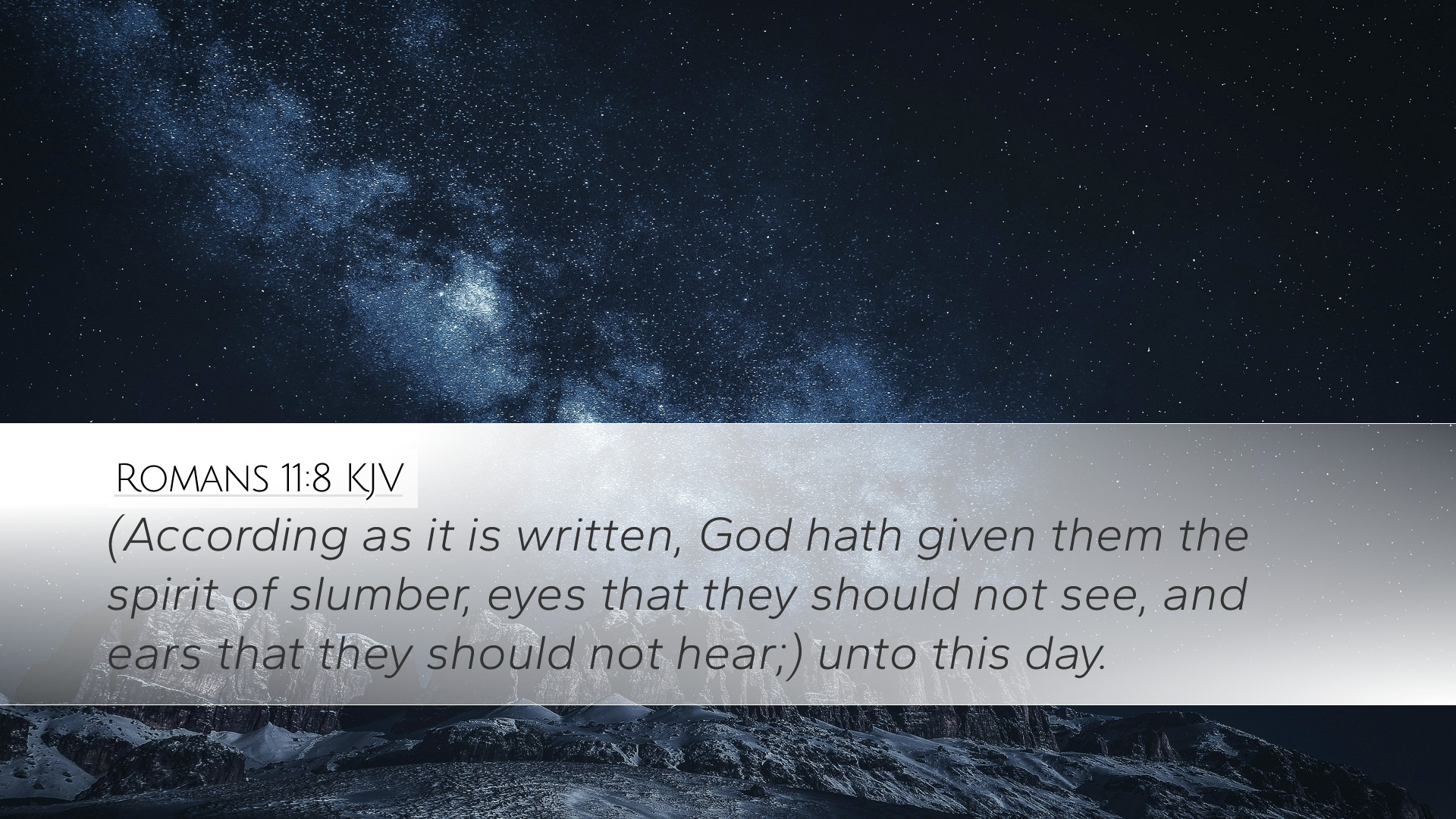Commentary on Romans 11:8
Romans 11:8 reads: “As it is written, God gave them a spirit of stupor, eyes that should not see and ears that they should not hear, unto this day.” This verse presents a significant theological insight into the condition of Israel in relation to the Gospel and God's sovereign plan for His people. The following commentary blends perspectives from public domain sources to provide a comprehensive examination of this passage.
Contextual Analysis
The broader context of Romans 11 is crucial for understanding this verse. The Apostle Paul, addressing a predominantly Gentile audience, is grappling with the question of Israel's unbelief and its implications for God's promises. Paul argues that although many Israelites have turned away from the Gospel, this does not indicate that God's promises have failed. Instead, he posits this condition as part of God's providential plan, which ultimately leads to the inclusion of the Gentiles.
The Concept of Stupor
According to Matthew Henry, the "spirit of stupor" refers to a state where the heart is hardened and the mind is blinded. This spiritual condition is not solely of human origin but is also seen as the divine hand of God at work. He emphasizes that this stupor serves a dual purpose: it protects the sanctity of God’s word while simultaneously preparing a remnant for salvation.
Divine Sovereignty
Adam Clarke elaborates on the idea of divine sovereignty implied in this verse. He points out that God's judicial hardening is a direct consequence of a nation’s rejection of divine truth. The reference to eyes that cannot see and ears that cannot hear echoes the prophetic language found in Isaiah and reflects a deep spiritual blindness that results from persistent unbelief. This hardening is not arbitrary; it signifies a divine response to a nation that has consistently refused to heed God’s voice. Clarke suggests that this serves as a solemn warning about the seriousness of rejecting the Gospel.
Historical Background
Albert Barnes places this verse in the context of Old Testament prophecy, particularly referencing Deuteronomy 29:4 and Isaiah 29:10. These texts provide a background to understand how God has, throughout history, allowed Israel to suffer from spiritual blindness as a consequence of their disobedience. Barnes notes that this is a humbling reminder that Israel, despite being God's chosen people, faces the discipline of God for their unbelief. He also reflects on the mercy inherent in God’s plan, which allows for the potential for restoration and redemption.
Implication for Gentiles
As Paul continues his discourse, the implication for the Gentiles is significant. Paul makes clear that the hardening of Israel is not the final word; rather, it serves to promote the spread of the Gospel among the Gentiles. This divine strategy indicates that God’s purposes are larger than human understanding, as seen in the mysterious ways of His providence concerning salvation. According to Henry, this aspect of God's plan showcases His infinite wisdom and love — for even in judgment, God is working toward a greater good.
Spiritual Reflection
This verse challenges us to reflect on our own spiritual condition. The potential for intellectual and spiritual blindness permeates every generation, and the admonition is to remain vigilant against hardening our hearts to God’s revelation. According to Clarke, it is imperative for believers to acknowledge their dependence on God for sight and understanding in the faith journey.
Conclusion
In Romans 11:8, we encounter profound lessons about human depravity, divine sovereignty, and the mercy of God. The insights from the commentaries of Henry, Clarke, and Barnes remind us that while Israel's rejection of the Gospel seems to pose a dilemma, it is part of God’s overarching redemptive narrative. Understanding this context enables pastors, students, theologians, and Bible scholars to better appreciate God’s unchanging promises and the astonishing breadth of his mercy.


